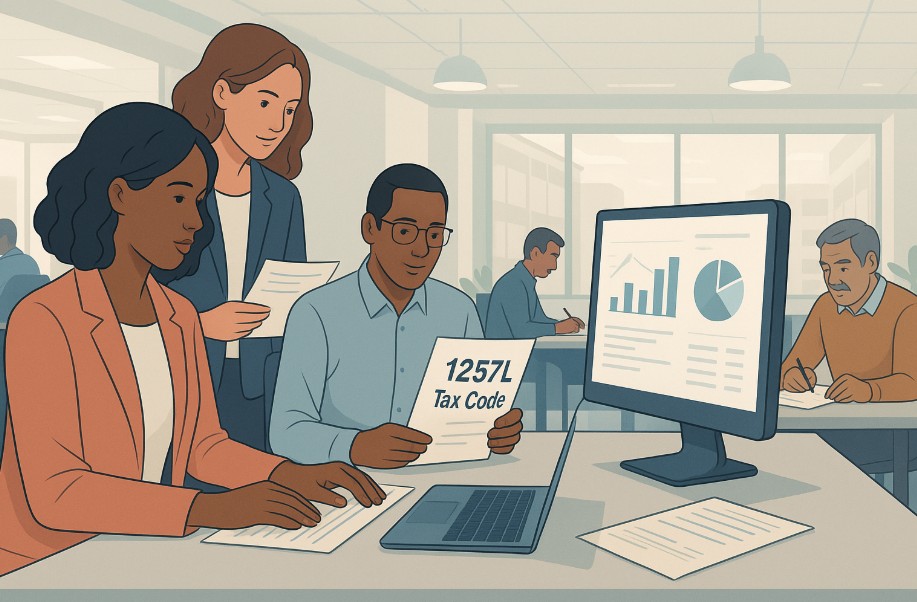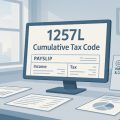Last Updated on: 21st June 2025, 06:48 am
Have you ever glanced at your payslip and wondered what the 1257L tax code means or why it appears there? You’re not alone. This code is one of the most common tax codes in the UK, and it plays a vital role in determining how much income tax is deducted from your wages.
Understanding your tax code can help you avoid overpaying or underpaying tax, which might affect your take-home income significantly. The 1257L code is more than just a string of numbers and a letter; it reflects your tax-free personal allowance and can vary based on your circumstances.
Whether you’re starting a new job, switching roles, or simply reviewing your finances, knowing what this code means is essential. Let’s dive into the details and make sense of what the 1257L tax code really stands for in the UK.
What Is the 1257L Tax Code?

The 1257L tax code is the standard tax code assigned by HMRC for most individuals in the UK for the 2025–2026 tax year. It tells your employer or pension provider how much of your income is tax-free before deductions are applied through PAYE.
The number 1257 means you are entitled to a personal allowance of £12,570, which is the amount of income you can earn each year without paying income tax.
The letter L indicates that you’re eligible for the standard tax-free Personal Allowance. This code is typically given to those who have one job and no other untaxed income or taxable benefits.
Here’s what it means in practice:
- If your salary is £30,000, then £12,570 is tax-free.
- The remaining £17,430 is taxable at the standard income tax rate.
In short, 1257L ensures the right amount of tax is deducted from your income, reflecting your basic personal allowance. It’s crucial to ensure this is correctly assigned.
How Does the 1257L Tax Code Affect Your Take-Home Pay?
If your payslip shows the 1257L tax code, it’s worth knowing how this impacts your actual earnings. This tax code directly affects your take-home pay by determining how much of your income is taxable.
How Does PAYE Calculate Your Income Tax?
Under PAYE (Pay As You Earn), tax is automatically deducted based on your tax code.
If your tax code is 1257L:
- You won’t pay tax on your first £12,570 of income annually.
- Any income above this is taxed at 20 percent (basic rate), 40 percent (higher rate), or 45 percent (additional rate), depending on total earnings.
What’s the Difference Between Tax-free and Taxable Income?
- Tax-free income: First £12,570 you earn in a year.
- Taxable income: Any earnings above £12,570.
What’s an Example of 1257L in Action?
Consider someone earning £27,000 a year:
- £12,570 is tax-free.
- £14,430 is taxable at 20 percent, resulting in £2,886 in annual tax.
- Net take-home income after tax would be approximately £24,114.
Having the correct tax code ensures you pay just the right amount, not more or less.
Why Do Most People in the UK Have the 1257L Tax Code?

The 1257L tax code is not assigned at random, it’s given to the majority of workers across the UK who meet standard employment criteria. This tax code applies automatically to most people and ensures that basic income is taxed fairly.
What Makes 1257L the Standard Tax Code?
It’s the default for people who:
- Work one full-time job
- Have no untaxed income
- Don’t receive company benefits that impact taxable income
Who is Eligible for the Personal Allowance?
- UK residents earning below £100,000 annually
- Individuals without additional income from freelance work or investments
- Workers not receiving taxable state benefits or perks like a company car
How Commonly is 1257L Used in the UK?
It’s estimated that millions of UK workers carry this code, making it the most frequently applied across the workforce. It’s a stable and predictable code that reflects the norm in the UK tax system. Employers use this code unless advised otherwise by HMRC.
Is the 1257L Tax Code Always Correct?
While 1257L is standard, it’s not guaranteed to be correct in every situation. Mistakes can occur, and if left uncorrected, you may end up underpaying or overpaying tax.
Errors can happen when:
- You switch jobs without providing a P45
- You begin receiving untaxed income like freelance payments
- You have multiple employers at the same time
- You receive taxable benefits that aren’t updated in your records
Sometimes, the 1257L code is used temporarily until HMRC has all the correct details, which might result in a “W1”, “M1”, or “X” version this indicates it’s being used as an emergency tax code.
Keeping an eye on your tax code ensures accuracy. Regularly checking your HMRC record can help avoid financial surprises.
What Should You Do If You Think Your Tax Code Is Wrong?
If you suspect your tax code is incorrect, there are a few simple steps you can take to resolve it promptly. Identifying and correcting an incorrect code ensures you avoid paying too much or too little tax.
How Do I Check My Tax Code Online?
Visit your personal tax account at gov.uk and log in. Your current tax code, employment details, and any adjustments are shown clearly.
How Do I Contact HMRC About a Wrong Tax Code?
| Contact Method | Details |
| Phone | 0300 200 3300 |
| Online Service | Sign in to HMRC |
| Post | HMRC, Pay As You Earn, PO Box 1970, Liverpool, L75 1WX |
Why Are Payslips and Tax Code Letters Important?
- Payslips show which tax code is being used by your employer.
- HMRC letters (P2) confirm any changes made to your code.
Correcting a tax code mistake early helps avoid future complications with tax refunds or arrears.
How Does the 1257L Tax Code Work with Multiple Jobs or Pensions?

When you have more than one job or income source, tax codes can become a little more complex. The 1257L code usually only applies to your main source of income, not all.
How Are Secondary Incomes Taxed?
If you have:
- A second job
- A private pension alongside employment
- Freelance earnings
Then only one source of income can use the full £12,570 allowance.
Can I Split My Tax-free Allowance?
No, you cannot split your allowance across multiple jobs. HMRC assigns it to one employment.
Your other jobs will likely use codes like:
- BR (Basic Rate): all income taxed at 20 percent
- D0: income taxed at 40 percent
- D1: income taxed at 45 percent
What if I See BR, D0 or Emergency Codes?
These codes ensure all income is taxed without personal allowance deductions. If this seems incorrect, contact HMRC to adjust your records accordingly.
Understanding these codes helps prevent accidental underpayment or overpayment.
Has the 1257L Tax Code Changed in Recent Years?
Tax codes evolve with budget announcements and inflation, and the 1257L code has seen its share of updates in the past decade.
How Has the Personal Allowance Changed Over Time?
- In 2015, the allowance was £10,600.
- By 2020, it rose to £12,500.
- For the 2025–26 tax year, it’s £12,570, hence the code 1257L.
How Do Budget and Fiscal Updates Affect It?
When the government adjusts income tax brackets or freezes thresholds, HMRC reflects these changes in tax codes. These updates ensure PAYE deductions remain accurate.
What Should We Expect in the Future?
If inflation rises significantly or new tax policies are introduced, the personal allowance may be reviewed. However, any changes will be clearly communicated by HMRC before implementation.
Staying informed ensures you’re prepared for any adjustments.
What Are the Common Misunderstandings About the 1257L Tax Code?

The 1257L code might appear simple, but it’s often misinterpreted by employees and even some employers. These misconceptions can lead to confusion about take-home pay.
Some common misunderstandings include:
- Believing that 1257L guarantees no tax payment
- Thinking it applies to all income sources
- Assuming it never needs updating once assigned
- Mistaking emergency tax codes like 1257L M1 for the standard version
Another major misconception is overlooking how company benefits like a car or health insurance can affect tax code eligibility. Always check for updates from HMRC.
By clearing up these misunderstandings, you’ll have a more accurate view of your tax responsibilities.
What Are the Essential Facts About the 1257L Tax Code?
Now that you’ve explored the common misunderstandings, it’s helpful to review the essential facts about the 1257L tax code in a clear and concise format.
To make things easier, here’s a quick breakdown of the most important details you should know about how the 1257L tax code works.
Understanding the key components of the 1257L tax code can help you manage your income more effectively and avoid common tax pitfalls.
| Feature | Details |
|---|---|
| Tax Code | 1257L |
| Annual Tax-Free Allowance | £12,570 |
| Applies To | Main job or pension |
| Letter ‘L’ Meaning | Standard personal allowance entitlement |
| Used With | PAYE system |
| Common Usage | Full-time workers with no other taxable income |
| Changed Recently? | Last updated in April 2021 |
| Emergency Code Format | 1257L W1, 1257L M1, or 1257L X |
| Who Assigns It | HMRC |
| Can It Be Wrong? | Yes, especially with job changes or missing P45 |
These essential facts offer a clear snapshot of how the 1257L tax code works, helping you stay informed and in control of your tax situation.
Conclusion
Understanding the 1257L tax code is essential for managing your finances and ensuring you’re not overpaying or underpaying income tax. Whether you’re employed full-time, have multiple jobs, or receive pension income, this tax code determines how much of your earnings remain tax-free.
Most workers in the UK will come across this code at some point, and recognising its purpose and implications can give you better control over your money.
Always double-check your tax code annually or when your job circumstances change. Being proactive can save you from unexpected tax bills and ensure your payslips are accurate.
FAQs
Can I change my 1257L tax code manually?
No, only HMRC can change your tax code, but you can contact them to request a correction.
Does 1257L mean I won’t pay any tax?
Not entirely. It just means your first £12,570 is tax-free and any income above that will be taxed.
What happens if I have the wrong tax code?
You may pay too much or too little tax, and you’ll need to contact HMRC to correct it.
How often does HMRC update tax codes?
Usually once a year in April, but updates can also happen mid-year if your circumstances change.
Will 1257L change if I get a bonus or promotion?
It might, especially if your income exceeds certain thresholds or you begin receiving taxable benefits.
What does the “L” stand for in 1257L?
The L shows you’re entitled to the standard personal allowance without special circumstances.
Can my employer fix a tax code issue for me?
No, only HMRC can correct tax codes, though employers apply them through payroll once updated.




















No Comments
Leave a comment Cancel